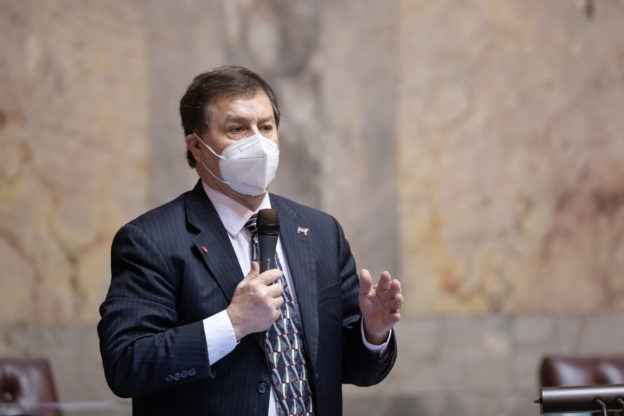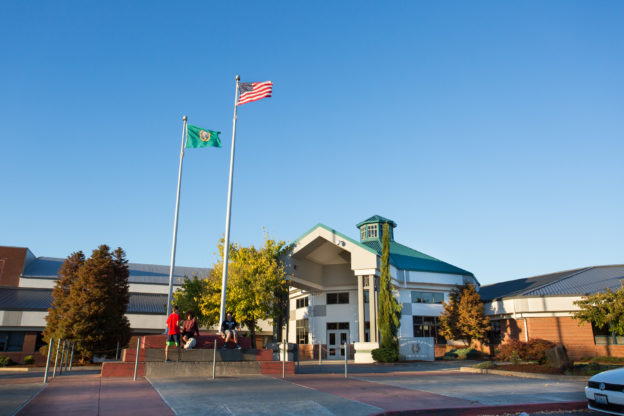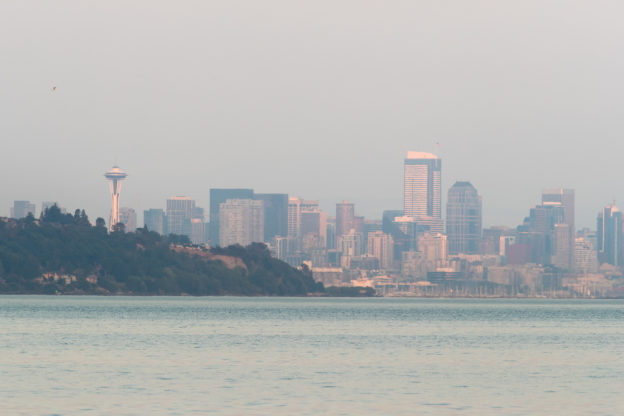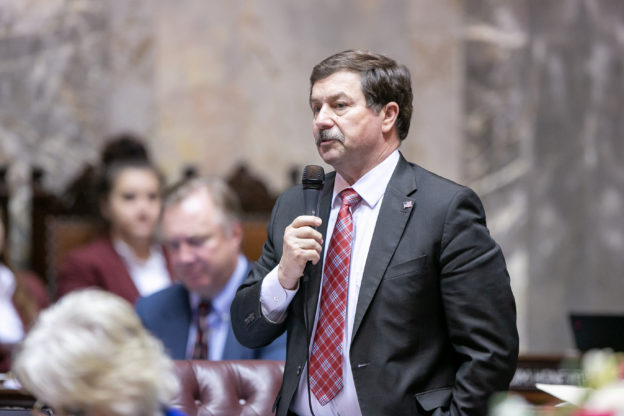Author Archives: brianzylstra
9th District Sen. Mark Schoesler talks about the long-term care bills that were being considered by the Senate this week. He also gives a preview of the upcoming state revenue forecast.
Sen. Mark Schoesler wants 9th District residents and others to know the Washington State Board of Health is surveying the public about requiring the COVID-19 vaccine for children to attend school in Washington.
“I’m concerned that parents and caregivers may not know about the chance to offer their input on this important issue affecting students,” said Schoesler, R-Ritzville. “Whether they support or oppose a vaccine requirement for kids to be allowed to enter school, it’s really important to take part in this survey and let the state know what they think of this idea.”
Schoesler said he and other legislators have received many calls and emails from constituents on the issue of whether students should be required to be vaccinated against COVID-19.
“Many parents and others in my district feel strongly about this issue,” said Schoesler. “This survey gives them a chance to be heard by the state agency that will make the ultimate decision.”
The state Board of Health is seeking input from the public on behalf of a technical advisory group has formed to consider requiring the COVID-19 vaccine for children to attend school in the state. The technical advisory group, which includes stakeholders in education, health and the public, will meet to consider whether to add the COVID-19 vaccine to the state’s list of required vaccines for children and teens to attend school.
Schoesler said it is possible that a legislator might someday introduce a bill requiring students to receive the COVID-19 vaccine to attend school.
The survey, which seeks responses from parents and caregivers, can be found here. It features five questions:
- Would adding COVID-19 vaccine as a requirement for school entry make you more likely or less likely to get your child vaccinated?
- How burdensome would an additional immunization requirement for school entry be for you and your family?
- What are some of the burdens you face to getting your child vaccinated against COVID-19?
- What are some of the benefits you see to vaccination? Do the possible benefits of vaccinating your child against COVID-19 reduce the impact of identified burdens of obtaining the vaccine?
- Do you believe adding COVID-19 vaccine as an immunization requirement for school entry is reasonable? Why or why not?
9th District Sen. Mark Schoesler talks about how the 2022 legislative session is being run, with committee meetings being held remotely and only a few senators appearing in person for floor sessions. He also gives updates on two of his bills – SB 5202, which tries to help school districts with building maintenance needs; and SB 5342, which aims to improve irrigation district elections.
A proposal prime-sponsored by 9th District Sen. Mark Schoesler that would improve irrigation district elections has been unanimously approved by the Senate for the second time in nearly a year.
The Senate today unanimously passed Senate Bill 5342, which would allow mail-in ballot elections for irrigation districts and identify qualified district electors for irrigation districts. It also would create a gross misdemeanor violation when election-security requirements for irrigation-district elections are violated.
“Irrigation-district elections have become outdated, which has become a concern,” said Schoesler, R-Ritzville. “This bill provides an overdue update to irrigation-district elections and it increases election security for them. A work group created a couple of years ago reviewed election policies and procedures used by irrigation districts and concluded that many of the state laws that deal with these elections needed to be updated. This bill reflects the final recommendations of that work group.”
Last March, the Senate passed the bill 48-0, but the House did not take action on it, sending the proposal back to the Senate at the end of the 2021 session. On Jan. 13, the Senate Housing and Local Government Committee amended and then passed the bill.
Senate Bill 5342 now returns to the House of Representatives for further consideration.
For the second time in nearly a year, the Senate has approved a bill introduced by Sen. Mark Schoesler that would help school districts in Washington address their building maintenance needs.
Senate Bill 5202 would allow school districts to create a “depreciation subfund” that can receive a transfer of up to 2 percent of a school district’s general fund each fiscal year.
After originally passing the bill 44-4 last February, the Senate today again approved it, this time on a 46-2 vote.
“This bill would provide another path for school districts to handle building- or facility-maintenance needs,” said Schoesler, R-Ritzville. “Sometimes it can be better for a school district to pay cash for a building repair or to set aside money for emergencies when they arise. Establishing this subfund is a way to help students learn in a healthy environment since school buildings would be in better condition.
“School administrators have recognized the value of this proposal, and I’m pleased that nearly all of my Senate colleagues again approved this bill today.”
Senate Bill 5202 now returns to the House of Representatives for further consideration. During the 2021 legislative session, the bill was passed by the House Education Committee but did not reach the House floor for a vote. After that session ended, Schoesler’s bill reverted to the Senate, prompting today’s revote.
For many years, environmentalists and others have decried increasing pollution in Puget Sound, pointing out how it is harming water quality and the wildlife that relies on the sound.
Even though he lives hundreds of miles from the waterway, 9th District Sen. Mark Schoesler has introduced a proposal that aims to help make Puget Sound cleaner.
“It’s no secret that Puget Sound has become more polluted over the years, and one key reason is the recent raw sewage spills from publicly owned domestic wastewater treatment plants,” said Schoesler, R-Ritzville, who pointed to last January’s accident in which 11 million gallons of storm water and untreated sewage escaped from Seattle’s West Point Treatment Plant into Puget Sound. “Governor Inslee and others make a big deal about having stream buffers to protect water and fish and keeping untreated stormwater and runoff out of the sound, but I think they haven’t given raw sewage spills from treatment plants the same level of concern. This is a serious problem that should be addressed now. This bill would help us get there, and it is a better policy approach to protecting salmon than stream buffers and breaching the Snake River dams.”
Schoesler’s measure, Senate Bill 5786, would aim to protect Puget Sound from wastewater pollution by requiring the state Department of Ecology to strengthen the sound’s nutrient general permit. The measure has been referred to the Senate Environment, Energy and Technology Committee for consideration.
“The sewage entering Puget Sound is not only unhealthy and dangerous for humans, it also is unhealthy and dangerous for the fish, shellfish, marine animals and birds that live in or near the sound,” said Schoesler. “If we really care about Puget Sound and the wildlife that relies on it, we need to start focusing on keeping raw sewage from polluting the sound.”
Schoesler said Ecology has identified publicly owned domestic wastewater treatment plants as a significant source of excess nutrients, such as nitrogen, which contribute to low oxygen levels in Puget Sound. However, the department’s Puget Sound nutrient general permit, which took effect on Jan. 1 this year, will not sufficiently protect Puget Sound from pollution caused by raw sewage.
Following today’s national inflation news that shows prices are 6.8% higher than a year ago, the highest inflation increase since June 1982, 9th District state Sen. Mark Schoesler is calling for Gov. Jay Inslee and legislative Democrats to offer tax relief to Washingtonians to help offset the financial struggles caused by inflation.
“Consumers throughout the U.S. have had to pay higher prices on many items over the past year,” said Schoesler, R-Ritzville. “Food prices have risen 6.1 percent, energy prices have skyrocketed 33 percent, new vehicles are 11.1 percent higher, medical care is 2.1 percent higher and shelter is up nearly 4 percent. While salaries have risen for many, they haven’t come close to keeping up with rising inflation, and it’s making it harder for families and individuals to make ends meet. At a time when the state has a huge surplus, now is the time for the governor and the Legislature to provide tax relief to hard-working people who are struggling because of inflation.”
Inslee is expected to unveil his state supplemental operating budget proposal next week.
Schoesler serves on the Senate Ways and Means Committee, which addresses budget and tax issues.
The 2022 legislative session begins Jan. 10 and is scheduled to last 60 days.















